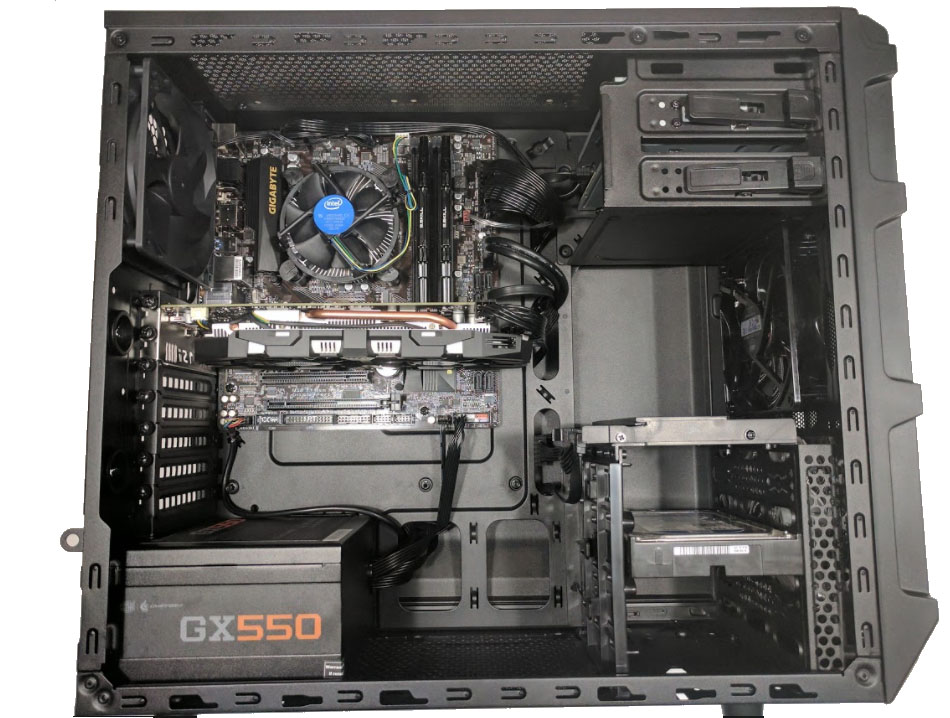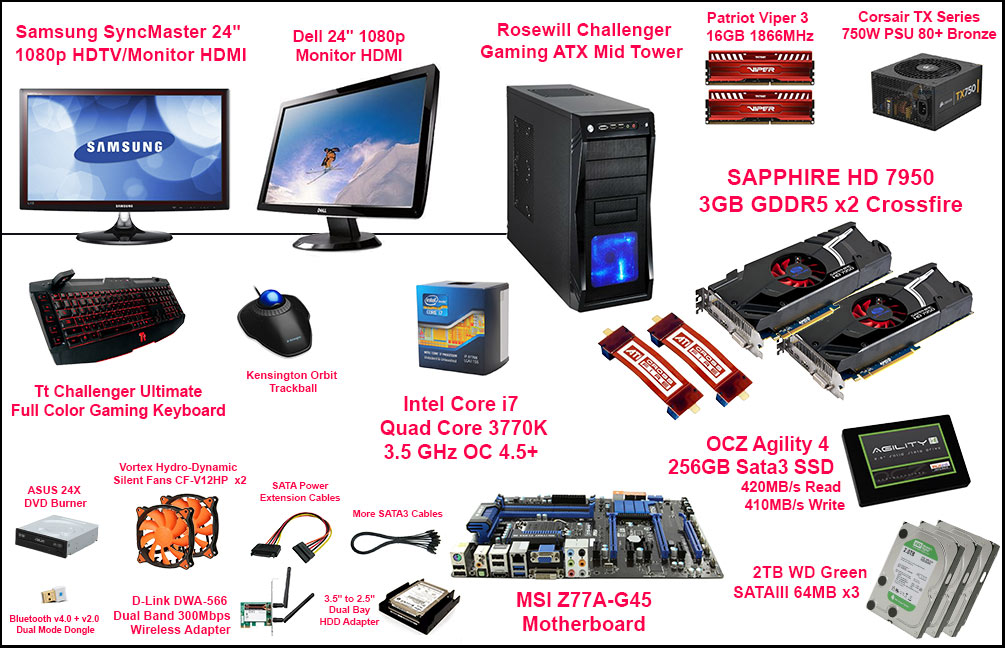Essential Computer Components for Gaming: A Comprehensive Guide
Introduction
Are you planning to plunge into the thrilling world of PC gaming, or are you an existing player who hopes to grasp more about the core components of your gaming machine? Pc gaming is an enticing gateway into a mystical realm where immersive experiences, 3D adventures, real-time simulations, and electrifying multiplayer sessions provide endless entertainment. However, to fully enjoy these experiences, it's essential to understand what computer components are important for gaming. Read on as we take you through an in-depth examination of these components and how they orchestrate a smooth, engaging gaming experience.
What Makes Up a Gaming Computer?
A high-performance gaming computer consists of complex components, each contributing to an overall powerful gaming experience. These primary components include:
- Central Processing Unit (CPU): Also known as the 'brain' of the computer, the CPU executes instructions and makes important calculations that allow games to run smoothly.
- Graphics Processing Unit (GPU): This component is synonymous with the heart of a gaming system. It translates data into detailed images and high-resolutions displays, enabling gamers to experience rich, immersive graphics.
- Random Access Memory (RAM): This acts as the agile 'foot soldier,' allowing quick data access in any sequential order, which pushes for efficient gameplay, especially for more demanding games.
- Storage Drives (SSD/HDD): SSDs offer superior performance, providing faster loading times for games, while HDDs are cost-effective and offer higher storage capacity.
- Cooling System: Like the unsung hero, a good cooling system dissipates heat away from the computer, maintaining optimum performance levels even during prolonged gaming sessions.
Each of these components plays a significant role in providing an enhanced gaming experience, justifying their place in a gamer's shopping checklist.
Why is a Powerful CPU Essential for Gaming?
It's vital not to undersell the indispensability of a robust Central Processing Unit (CPU) for an enthralling gaming experience. Think of it as the MVP of your gaming PC, pulling strings behind the scenes to ensure a seamless play. Responsible for executing the instructions of a computer program, a strong CPU can determine the overall performance and effectiveness of gaming tasks.
Here's an accurate breakdown of why gaming enthusiasts should invest in a powerful CPU:
- Performance Powerhouse: A dominant CPU can process more instructions every second, resulting in reduced fragmentation and lag. This becomes particularly noticeable in strategy and simulation games that require hefty calculations.
- Asset Management: A CPU plays a critical role in managing various game assets, inclusive of the loading and unloading of different game scenes. This ability fosters a smoother and more immersive gaming experience.
- Processing AI and Physics: In modern games, Artificial Intelligence (AI) and real-world physics greatly enhance the gameplay's realism. A strong CPU not only manages these complex instructions but also does so swiftly, allowing games to reach their full potential.
Let's take a look at some crucial considerations before choosing a CPU for your gaming PC:
- Socket Compatibility: Ensure that the chosen CPU is compatible with your motherboard.
- Futureproofing: It's wise to invest in slightly 'more’ CPU than you currently need to account for future technology advancements.
- Balancing Act: Strive for a balance between your CPU and GPU. An overly powerful CPU with a weak GPU could lead to performance bottlenecking, limiting the overall gaming performance.
In conclusion, while all components of a gaming PC are important, the CPU often holds the reins. It's not merely an add-on; instead, a good CPU is the cornerstone of high-performing gaming equipment.
How Does Graphics Card Enhance the Gaming Experience?
The power of the graphics card, also recognized as the Graphics Processing Unit (GPU), can dramatically shape your gaming experience. Acting as the pulse of a gaming computer, the GPU interprets data into a visually digestible format that your monitor can exhibit. But what exactly does a robust GPU contribute to your gaming adventure? Let's delve into its striking features:
1. High-resolution graphics: A high-quality GPU is capable of rendering stunningly crisp, high-resolution graphics. This vivid detail adds a new layer of immersion, pulling gamers further into their digital odysseys.
2. Fluid animations: In addition to sharply detailed imagery, powerful GPUs are designed to deliver smooth animation. The swift and seamless in-game movements stem from the robust capabilities of an advanced GPU.
3. Real-time Ray Tracing: Arguably, one of the most exciting features of modern, high-end GPUs is the capacity for real-time ray tracing. This technique, primarily used in the film industry, enhances light and shadow effects, imparting a realistic feel to the in-game environment.
4. Heavy workload management: Strong GPUs can handle demanding tasks quicker and more efficiently. This results in a drastic reduction of rendering time, augmenting the gaming experience.
5. Enhanced game realism: Unparalleled graphic detail, coupled with striking light and shadow effects powered by real-time ray tracing, amplifies the realism in games, providing a truly immersive experience.
In a nutshell, investing in a strong GPU could considerably enhance your gaming experience, transforming standard game-play into an immersive, lifelike digital journey.
Why is RAM a Critical Component in Gaming?
Understanding the role of RAM (Random Access Memory) in gaming is fundamental to reaping the benefits of an enjoyable gaming experience. So, why is the RAM a critical component in gaming? Here's a detailed look at its importance:
- Swift Data Access: RAM stands out because it enables the CPU to access data instantly, irrespective of its sequence. This feature ensures a quicker and efficient processing performance.
- Preventing Game Lag: More RAM means more space for data storage which in turn reduces chances of game lags or freezes. That way, you can enjoy a seamless and smooth gaming experience, unimpeded by technical glitches.
- Smooth Gameplay: Games with large open-world environments or complex AI coding demand a higher quantity of high-speed RAM. If a sufficient amount of RAM is present, it guarantees smoother and more realistic gameplay, significantly enhancing the overall gaming experience.
- Accommodate Demanding Titles: The addition of high-capacity RAM is crucial for running graphically demanding game titles. Several modern games require large amounts of RAM to function smoothly, making it an essential component in a gaming PC.
In the world of gaming, every millisecond counts. And that's precisely why having sufficient RAM in your gaming PC makes a substantial difference, providing quicker response times and a flawless gaming experience.
SSD vs HDD: Which is Better for Gaming?
Storage drives, either Solid State Drives (SSD) or Hard Disk Drives (HDD), are fundamental components of a gaming PC. Both options come with individual strengths and weaknesses that can significantly affect your gaming experience. Here's a comparison to help you better understand which is ideal for your gaming needs.
HDD:
- *Advantages:*
1. More affordable, allowing you to secure higher storage space at a lower cost.
2. Larger storage capacity - ideal for those with extensive game libraries.
- *Disadvantages:*
1. Slower performance compared to SSDs; this could lead to longer load times.
2. Higher noise production during operation.
3. More susceptible to physical damage due to movable parts.
SSD:
- *Advantages:*
1. Superior speed performance: Enables faster game loading and eliminates in-game lag.
2. Improved durability due to the lack of moving parts.
3. Quieter operation making your gaming experience more focused and immersive.
- *Disadvantages:*
1. More expensive per gigabyte compared to HDDs.
2. Lower storage capacity at the same price point as HDDs.
In the realm of gaming, SSDs are commonly favoured over HDDs because they provide a faster, more responsive gaming experience. Nonetheless, HDDs may be a practical choice if you're budget-conscious and need more storage space for a larger library of games. Ultimately, the decision comes down to personal preference, gaming habits, and budget considerations.
How Does a Cooling System Benefit a Gaming PC?
Cooling systems in a gaming PC are imperative due to the large amounts of heat generated during intense gaming sessions. They ensure the PC delivers optimal performance and extends its lifespan by preventing potential hardware damage. Let's unpack the critical benefits of having an effective cooling system in your gaming PC:
- Performance Enhancement: Cooling systems drive heat away from essential components, ensuring they operate efficiently even under intense gaming pressure. This results in smooth and uninterrupted gaming experiences.
- Durability: Proper cooling techniques safeguard your PC's components from overheating, extending their life and maintaining system stability.

- Overclocking: Advanced cooling allows for overclocking, where your PC performs faster than the usual speed. This is particularly valuable for gamers seeking heightened performance.
In conclusion, investing in an efficient cooling system in a gaming PC is a proactive step towards ensuring superior gaming experience and longevity of your machine.
Conclusion
Building or purchasing a gaming PC is not merely about getting the most expensive components available. Understanding the role and capabilities of each component and ensuring they work harmoniously together is essential in providing an immersive gaming experience. Whether it's the 'brain' of the PC, the CPU, the 'heart' GPU, or the supportive RAM, SSD/HDD, or cooling system, each element plays a critical role in gaming PCs.
Related FAQs about what computer components are important for gaming
What's the Role of the Power Supply Unit in Gaming PCs?
The Power Supply Unit (PSU) provides the necessary power to all components of a gaming PC. A PSU supplies consistent and clean power, ensuring that all parts, from the CPU and GPU to memory and drives, function efficiently. A reliable PSU is essential to maintain optimal performance and extend the lifespan of your gaming machine.
How Much Does a High-End Gaming PC Cost?
The cost of a high-end gaming PC varies greatly based on its components. On average, a high-quality system can range from $1,500 to over $3,000. Factors affecting the cost include the choice of CPU, GPU, RAM, storage type, and additional features such as cooling systems and casing.

Can Regular PCs be Upgraded for Gaming?
Yes, regular PCs can be upgraded for gaming. However, significant upgrades may be required for more demanding games. These can include a more powerful CPU, an advanced graphics card, increased RAM, a high-speed SSD, and a robust cooling system. Always ensure your power supply can support these enhancements.


